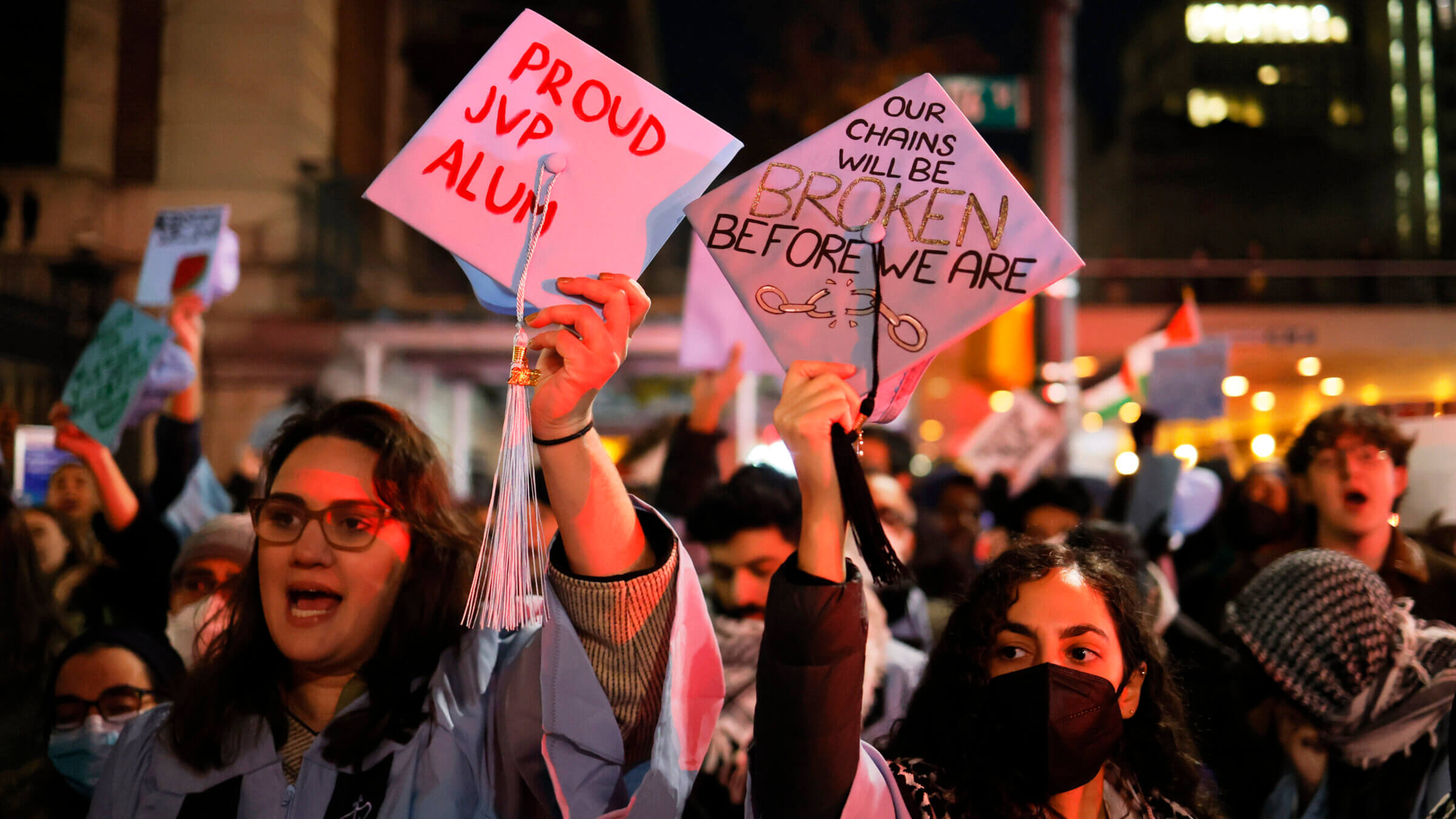Civil liberties groups are suing Columbia over suspension of pro-Palestinian groups
New York Civil Liberties Union demands reinstatement of Students for Justice in Palestine and Jewish Voice for Peace

People gather to protest the banning of Students for Justice in Palestine and Jewish Voice for Peace at Columbia University Nov. 20. Photo by Getty Images
This story was updated on March 12.
The New York Civil Liberties Union has filed a lawsuit against Columbia University over the school’s suspension of two student groups opposed to the war in Gaza. One group is the Columbia chapter of Students for Justice in Palestine; the other is the campus chapter for Jewish Voice for Peace.
“Universities should be havens for robust debate, discussion, and learning — not sites of censorship where administrators, donors, and politicians squash political discourse they don’t approve of,” said Donna Lieberman, executive director of the New York Civil Liberties Union, announcing the lawsuit on Tuesday.
A Columbia University spokesperson said the school does not comment on pending litigation. When the lawsuit was threatened last month, the school pointed to its interim policy on safe demonstrations, which guarantees the “right to speak” regardless of viewpoint, so long as that speech does not “interfere with the rights of others to speak, study, teach, and learn.”
University says groups violated policies on events
The groups were suspended after they organized a student walkout on Nov. 9. The university said the protest was unauthorized and that the groups had repeatedly violated school policies by failing to comply with “requirements for advance notice and consultation” in organizing events on campus. The suspension cannot be appealed and precludes the groups from holding future events or receiving university funding.
The NYCLU said complaints about student groups violating university policies must be formally adjudicated by the Student Governing Board, but the university said it was within the administration’s purview to determine whether policies were violated and what sanctions to impose.
The NYCLU cited a 1980 New York State Court of Appeals decision requiring universities to follow existing policies in sanctioning students or student groups. That ruling stated that for colleges to ignore their “own rules” whenever “officials in their wisdom see fit” reduces any guidelines “to a meaningless mouthing of words.”
Other Columbia controversies since Oct. 7
The controversy is just the latest at Columbia related to the aftermath of Hamas’ Oct. 7 attacks. The university — like many other elite schools — has been rocked by countless protests, along with clashes over what faculty, departments and student groups may say about Israel’s war in Gaza. Among the controversies at Columbia:
- In January, Columbia Law School rejected official recognition for Law Students Against Antisemitism. That group was the only one of nine student groups seeking recognition that didn’t get it. The group was later approved after the initial rejection was publicized.
- An Orthodox Jewish student has sued Columbia’s School of Social Work, claiming she faced discrimination.
- The U.S. House Committee on Education and the Workforce is investigating complaints that the university has failed to protect Jewish students.
- Barnard issued new rules giving the administration control over anything posted on official department websites, restricting faculty political activities and instituting a 28-day approval process for events. The new policies were announced after administrators removed a pro-Palestinian statement from a website for the department of women’s, gender and sexuality studies. That department responded by creating its own website outside of Barnard’s purview.
NYCLU alleges suspension perpetuates stereotypes
The NYCLU described the Nov. 9 event as a “peaceful demonstration and temporary art installation” opposing Israel’s military campaign in Gaza, which has killed thousands of Palestinians and damaged or destroyed half of the territory’s buildings.
The NYCLU said the SJP and JVP demonstration was “not unlike many other protests that have taken place on Columbia’s campus, historically and in the present-day,” and that other student groups had “engaged in similar conduct” without sanction.
The civil liberties organization also alleged that Columbia’s assertion that SJP and JVP had engaged in “threatening rhetoric and intimidation” perpetuates “pervasive and dangerous stereotypes about Palestinians, Arabs, Muslims, and individuals — particularly other people of color — who advocate for Palestinian rights.”
Private universities in New York are not bound by the right to free expression under the First Amendment, but the NYCLU said that “students protesting at private colleges still have the right to fair, equal treatment — and we are ready to fight that battle in court.”
















